
Contents:
- What is Artificial Intelligence (AI)?
- History of AI
- Stages/Types of AI
- Domains of AI
- What is NVIDIA AI Enterprise?
- What are the advantages of using NVIDIA AI Enterprise?
- Boston ANNA Ampere - NVIDIA Certified AI Solutions
What is Artificial Intelligence?
Artificial Intelligence, known as AI, put simply means 'intelligent machines'. These intelligent machines are computer systems that can perform tasks that would normally require human intelligence.
History of AI
Although AI has been making lots of headway in the public domain over the past decade, artificial intelligence and its concept has been around since the early 20th century. The timeline below shows some of the major milestones since then.
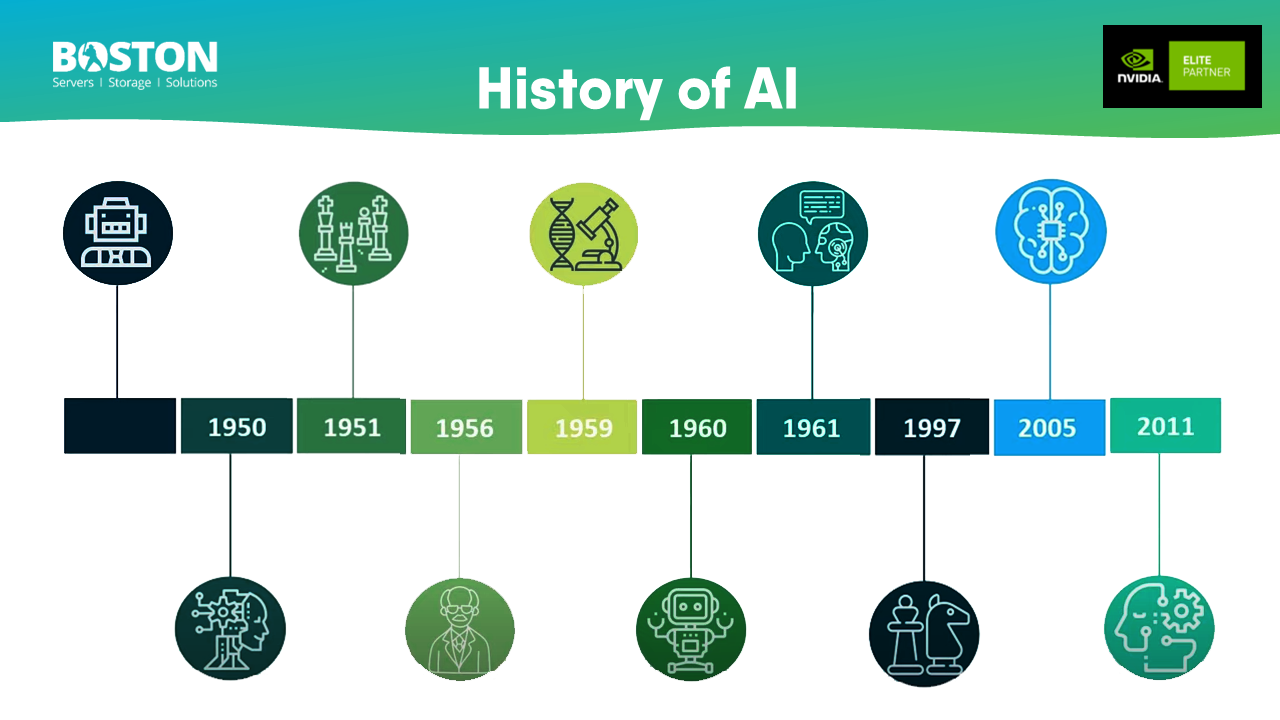
1950: Alan Turing started rumours of AI by publishing a landmark paper in which he speculated about the possibility of creating machines that can think
1951: GAME AI - Chris Strachey wrote a checkers program and Dietrich Prinz wrote one for Chess
1956: John McCarthy first coined the term ‘Artificial Intelligence’ in 1956 at the Dartmouth Conference
1959: MIT AI lab set up in 1959 and research into AI began
1960: First robot was introduced to the General Motors assembly line
1961: First AI chatbot (Eliza) came about
1997: IBM Deep Blue beats world chess champion Garry Kasparov in a game of chess
2005: DARPA Grand Challenge – Stanford Racing Teams autonomous robotic car STANLEY wins the challenge
2011: IBM Watson – a question answering system which defeated the two greatest jeopardy champions in the world, Brad Ritter and Ken Jennings
Modern day AI applications are being used in every walk of life, from autonomous vehicles through to CCTV image recognition, medical science, and general data science applications.
Stages/Types of AI
- Narrowly defined set of tasks
- Predefined set of tasks (e.g. Siri/Alexa/Self driving cars)
- Evolution of AI-machines will possess the ability to think/make decisions
- No existing examples of Strong AI
- Considered to be a threat to mankind by Stephen Hawking
Artificial Super Intelligence (ASI)
- The capability of machines will surpass human beings
There are 4 main types of AI:
Reactive Machine AI
- Operates solely based on present data, taking into account the current situation
- No inference from data for future actions
Limited Memory AI
- Uses short-term memory to decide/evaluate next actions. Temporary memory is used, e.g. autonomous driving vehicles using immediate data collected around the vehicles to determine next actions
- Artificial Narrow Intelligence (ANI) - Over 90% of enterprises are planning to invest
Theory of Mind AI
- Focus on emotional intelligence so that human beliefs and thoughts can be comprehended
Self-Aware AI
- Machines that have their own consciousness and become self-aware
- This type does not exist yet – Thankfully!
Domains of AI
There are currently six main domains of AI which are most commonly being used:
Machine Learning (ML)
- Machines interpreting/analysing data to solve real world problems (supervised, unsupervised, reinforced learning).
Deep Learning (DL)
- The process of implementing neural networks on high dimensional data to gain insights and form solutions, e.g., the logic behind facial recognition as used in Facebook. Deep lLearning is also used in autonomous vehicles e.g., Siri or Alexa.
Robotics
- Robotics use AI, such as Sophia the humanoid.
Expert Systems
- Learning and reciprocating human learning ability by using “IF-THEN” logic systems. This type is used in fraud detection, virus protection, and medical records.
Fuzzy Logic
- Uses the degree of truth rather than Boolean Logic. Often used in medical fields for complex problems needed for making decisions. Other samples are used in gear systems in cars.
Natural Language Processing (NLP)
- Analyses language used - Twitter uses this for abusive language checking, while Amazon use it for review analysis.
What is NVIDIA AI Enterprise
Every business function will be infused with AI, from human resources utilising AI for talent acquisition through automatic resume scanning and vetting, marketing and sales departments using personalised recommendations based upon analysing browsing and shopping habit data gathered, through to information systems using AI for fraud detection and cyber security. A lot of companies now have virtual assistants and chatbots on their websites or automated telephony systems. These are all driven by AI and utilise pre-trained models. Product development and process automation along with predictive maintenance are examples of where AI is used in everyday systems.

To perform these daily tasks and more, modern applications are now being used to transform every business, not just the large ones.

As a result of this, there is a requirement for small to medium businesses to easily approach enterprise level AI as well as allow the enterprise level business to scale up.
As a result of this requirement, the IT industry is now seeing a new approach towards AI and the development of AI based applications. Adoption of AI has been slow due to either lack of tools and platforms or the increasing complexity of AI and associated applications. Around 32% of IT professionals rate the increasing data complexity and data silos as a top barrier to AI Adoption, whereas 28% rate the lack of infrastructure as a top barrier. (Source)
This has resulted in a new approach to enterprise AI.
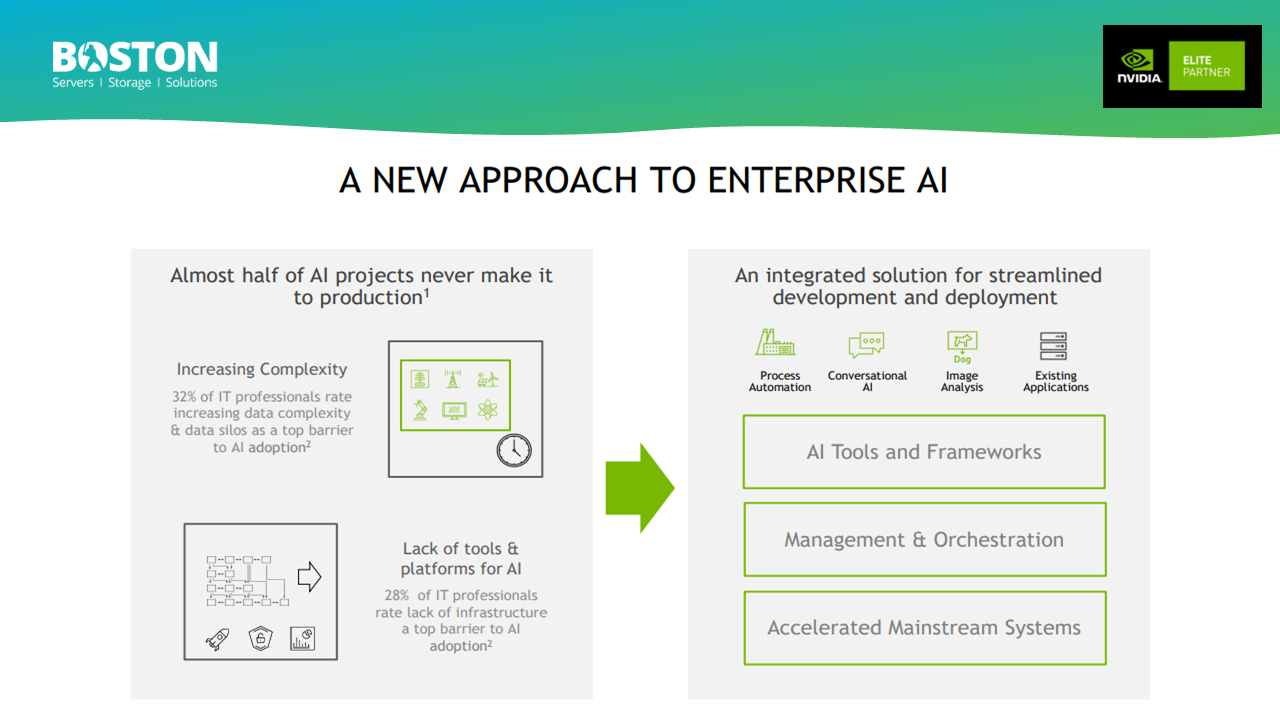
This new approach has been the reason for the creation and release of NVIDIA AI Enterprise.
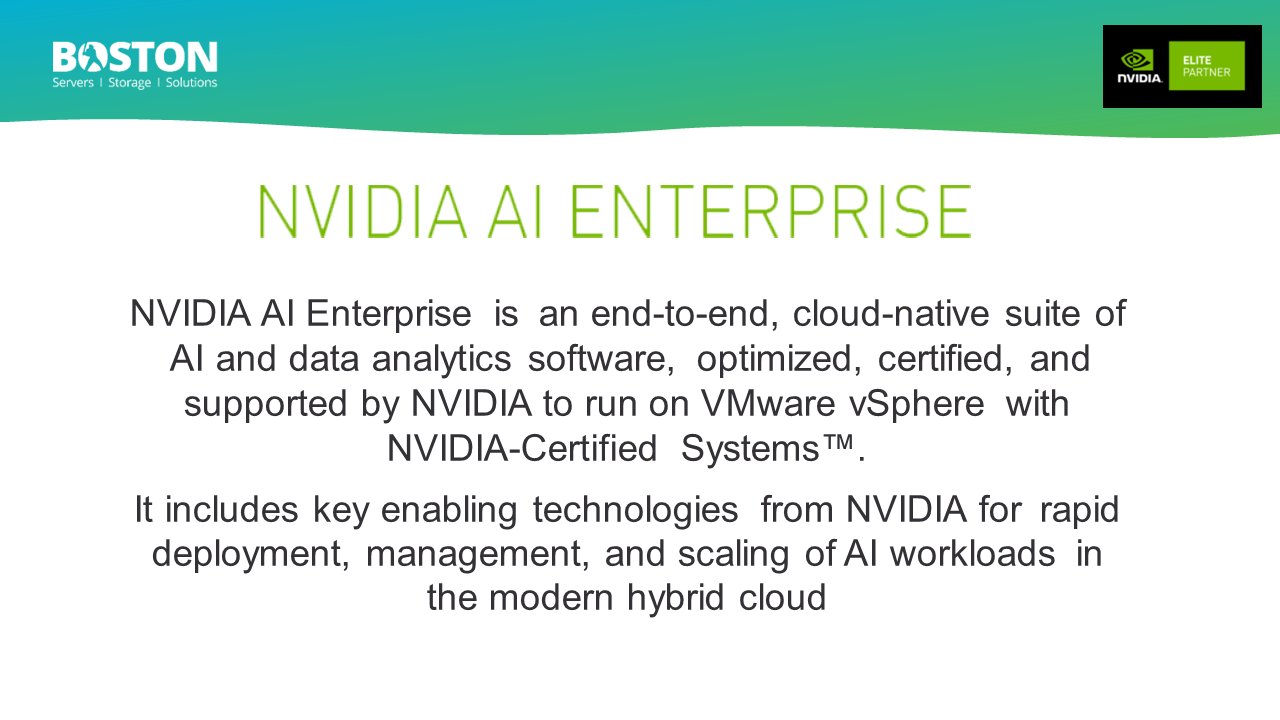
What are the advantages of using NVIDIA AI Enterprise?
NVIDIA AI Enterprise is a suite of tools certified for VMware vSphere, which are optimised for performance and come with NVIDIA Enterprise Support.
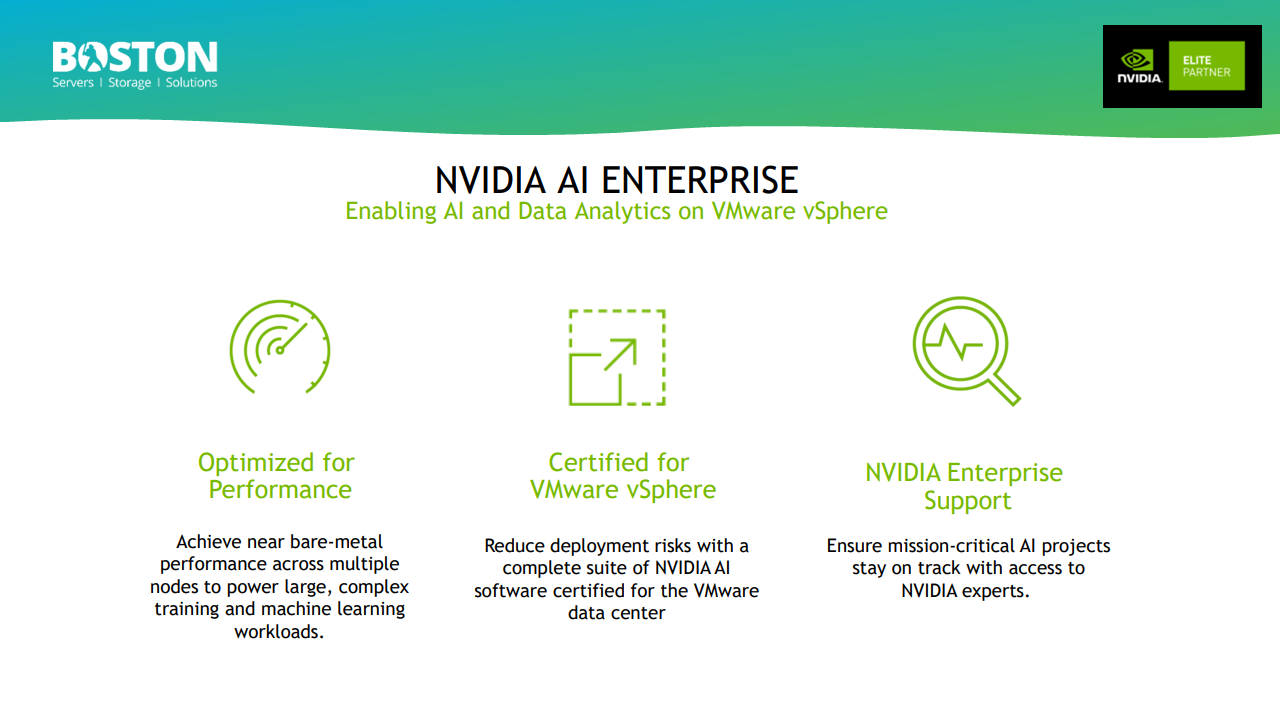
The advantage of this framework is the use of NVIDIA Certified Systems. It can be integrated into existing VMware infrastructure as it uses VMware vSphere and NVIDIA AI Enterprise suite provides a full software stack necessary for AI development. Additionally, NVIDIA Certified Systems benefit from full Enterprise support direct from NVIDIA.

Overview of the AI-Read Enterprise Platform
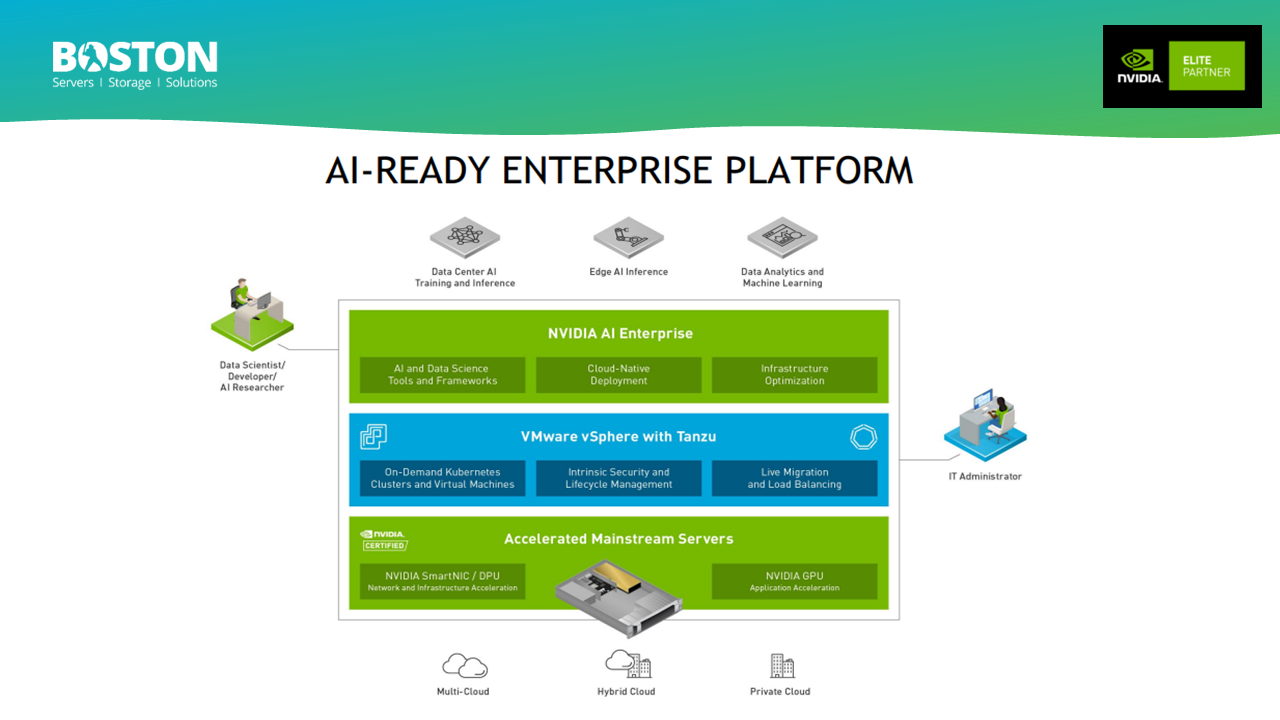
Once the NVIDIA AI Enterprise suite is installed, you will get access to the full end-to-end AI software stack via access to the NGC Catalogue.
The NGC Catalogue is a curated set of GPU-optimised software for AI, HPC and visualisation. The content provided by NVIDIA and third-party ISVs simplify building, customising, and the integration of GPU-optimised software into workflows, accelerating the time-to-solutions for users.

The NGC catalogue contains pre-trained AI models in containers for various applications from automatic speech recognition, image classification, object detection, and speech synthesis, to name a few. Access to these pre-trained models comes as part of the NVIDIA AI Enterprise suite, thus making it even easier for businesses to adopt AI development. Integrated into existing VMware infrastructure, managed through standard VMware vSphere, and followed by access to pre-trained models simplifies the whole AI adoption process whilst keeping costs down.
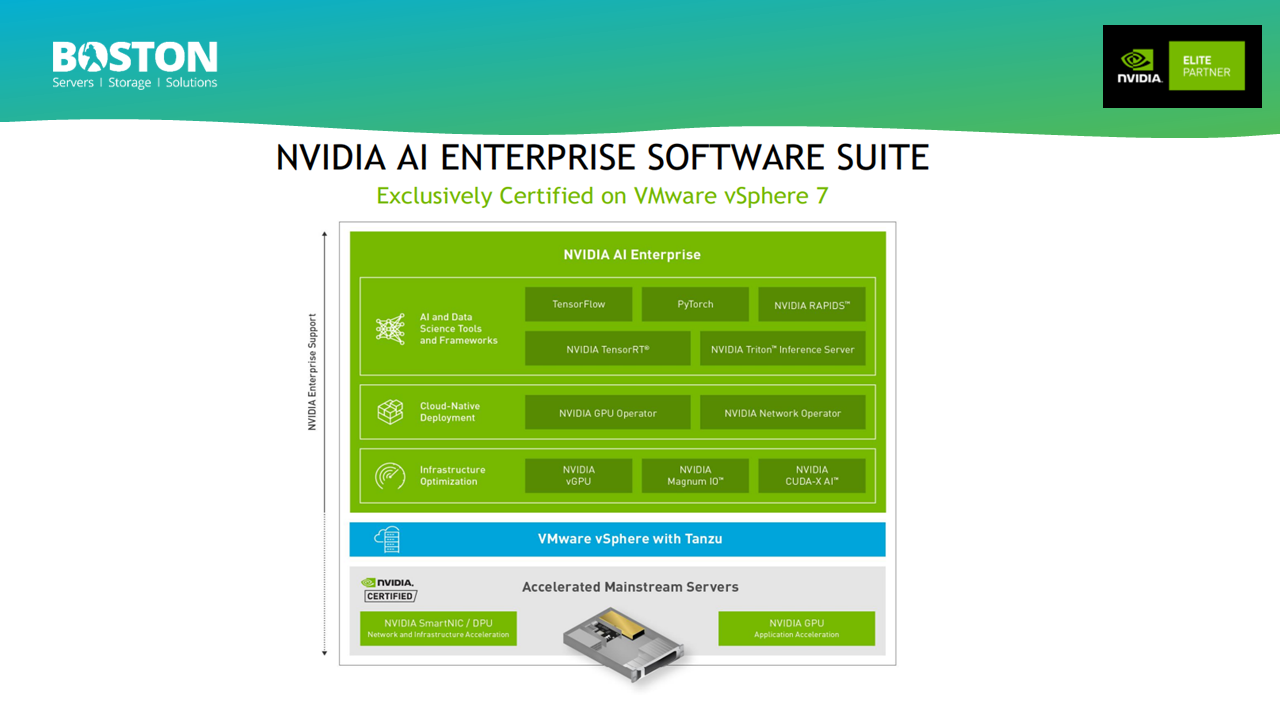
The only hardware requirement is using NVIDIA Certified systems for enterprises.

Here at Boston, being an NVIDIA Elite Partner, we offer our own NVIDIA Certified AI Enterprise solutions for various applications, from entry level through to enterprise level with scaling options.
The NVIDIA-Certified Systems programme encompasses a wide range of enterprise GPUs, and the latest smart network interface cards (SmartNICs) from NVIDIA. The certification test suite exercises the performance and functionality on a set of software that represents a wide range of real-world applications. This includes deep learning training, AI inference, data science algorithms, intelligent video analytics (IVA), high-performance computing (HPC), CUDA®, and rendering. It also covers infrastructure performance acceleration, such as network and storage offload, security, and remote management.
To overcome this barrier and give businesses that edge without the complexity, Boston has produced the ANNA Ampere range of systems which are NVIDIA-Certified Systems that bring together Supermicro servers, NVIDIA GPUs, and NVIDIA networking in optimised configurations. These configurations have been tested and validated for performance, manageability, security, and scalability and are backed by support from NVIDIA and Boston.
Boston ANNA Ampere - NVIDIA Certified AI Solutions
Boston ANNA Ampere provides the foundation for a complete enterprise accelerated computing platform. These servers provide industry-leading performance for AI, data analytics, and visualisation applications, and they can be managed with IT frameworks from industry leaders such as VMware.
These systems use NVIDIA AI Enterprise to deliver simple and cost-effective implementation of AI solution development platform in your environment.
Boston ANNA Ampere S2
Perfect for embarking on your AI journey, the new Boston ANNA Ampere S2 server features the power of up to 3 NVIDIA A30 double width GPUs. The system supports PCI-E Gen 4 for fast CPU-GPU connection and high-speed networking expansion cards. Scalable and easily integrated into existing VMware environments, ANNA Ampere S2 is the choice for starting your AI implementation.
Boston ANNA Ampere M1
The midrange AI offering from Boston, new ANNA Ampere M1 server features the power of up to 4 NVIDIA A40 GPUs. The system supports PCI-E Gen 4 for fast CPU-GPU connection and high-speed networking expansion cards. With 1 + 1 power redundancy it makes the system ideal for HPC and AI workloads. Designed with AI/Deep learning and Inference in mind, the ANNA Ampere M1 makes an ideal choice for a midrange system to start implementing advanced AI solutions.
Boston ANNA Ampere L1
The new ANNA Ampere L1 server features the power of NVIDIA A100 Tensor Core GPUs and the HGX A100 4-GPU baseboard. The system supports PCI-E Gen 4 for fast CPU-GPU connection and high-speed networking expansion cards. With GPU Direct RDMA and 1 to 1 mapping between network interconnects and GPU. It uses NVLink to provide GPU to GPU communications in a mesh system at speeds up to 200GB per second.
Boston ANNA Ampere XL1
The new ANNA Ampere XL1 server features the power of up to 8 NVIDIA A100 Double width GPUs. The system supports PCI-E Gen 4 for fast CPU-GPU connection and high-speed networking expansion cards. With 1 + 1 power redundancy it makes the system ideal for HPC and AI workloads. Designed with Speech Recognition, Computer vision, Inferencing and Data science in mind, the ANNA Ampere XL1 would be the perfect choice for all types of AI workloads.
For further information on the Boston ANNA Ampere range or NVIDIA AI Enterprise, call us on 01727 876100 and we will be happy to discuss various options with you.
Authors:
Waseem Pervez & Sonam Lama
Senior FAE, Boston Limited